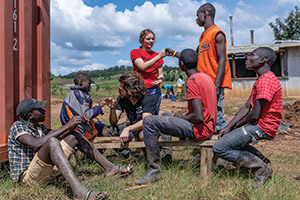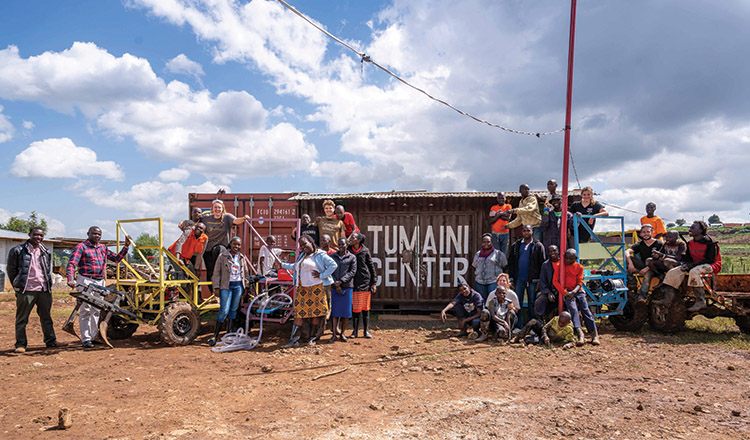Change can be scary, especially when it involves creating an unknown and uncertain path forward.
That’s been the reality for some former street kids in Kenya, who were displaced from their families because of issues such as poverty and political unrest. They left life on the streets, where they had developed their own survival system without the support of parents, to work with a team from Purdue and turn education into a brighter future.
The city of Eldoret, one of Kenya’s fastest-growing cities, is home to about 3,000 “street youth.” In 2014, a small group of these children advocated for the opportunity to learn in a school that was supportive of their needs, their interests, and the traumas they had experienced. They worked with a local teacher and an IU doctor to cofound an unconventional school called the Tumaini Innovation Center. Tumaini is the Swahili word for “hope.”
The center is one component of a partnership among the Purdue College of Pharmacy, the Academic Model Providing Access to Healthcare program, Eldoret community members, and numerous individuals in both Kenya and the United States. It is an alternative residential school for former street children who now learn foundational engineering skills to solve problems in their own community.
As the school was built, Purdue researchers developed a unique foundational curriculum for the students. They worked directly with students to hear their interests and create a challenging and relevant engineering class.
“These former street children came to us and said they wanted something different for themselves,” says Jennifer DeBoer, an assistant professor in Purdue’s School of Engineering Education. “They were ready to make a tough change. Our role and privilege was to show them the engineers within themselves. They were up to the challenge, ready to learn, interested in math, and intrigued by engineering. We were ready to empower them to build solutions.”

The engineering courses at the center use open-source materials, flipped classrooms, e-learning platforms, and teamwork. Students work on sustainability projects such as designing and installing a solar-powered electricity system for the center and optimizing vehicles to help farmers in the community. Initial support for the project was through a seed grant from the Innovation for International Development lab in Purdue’s Global Engineering Programs and Partnerships. The farm vehicles were designed and built by the Purdue Utility Platform team under John Lumkes in the Department of Agricultural and Biological Engineering.
“These are smart children who learned to make it in a hard situation on the street, and they came to us wanting to use that same creative thinking to meet the challenges in their community,” DeBoer says.
Dhinesh Radhakrishnan, an engineering education graduate research assistant who leads the engineering curriculum development and teacher training, says the goal is to turn part of the center into an incubation space for students and alumni to continue developing their ideas and innovations; entrepreneurship is a topic of interest to many of the students.
Radhakrishnan says he cannot even describe the feelings he experienced when a child who had been on the streets for years learned to explain the circuitry of a solar photovoltaic power system. That student completed the courses at the center and is now aspiring to finish secondary school and apply to university.
“It is an incredibly rewarding experience to take engineering knowledge and benefit communities and people in need,” Radhakrishnan says. “Growing up in India, I never imagined being able to make such an impact on children living on the streets of Kenya or anywhere.”

